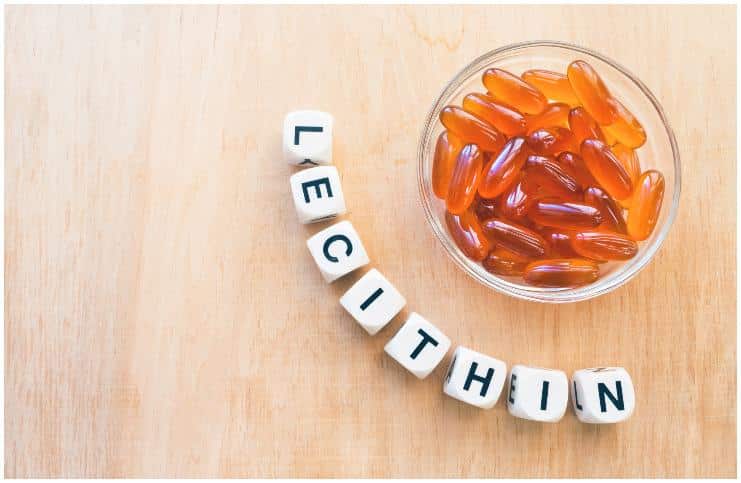Lecithin (or E322 in EU), the common name for a fat called phosphatidylcholine, is found in cells of all living organisms, and its presence is required for proper biological function.
This substance was first isolated in 1845 by the French pharmacist and chemist Theodore Gobley.
Composed of fatty acids, choline, glycerol, phospholipids, glycolipids, phosphoric acid and triglycerides lecithin, Theodore Gobley originally isolated this compound from egg yolk, and established the complete chemical formula of phosphatidylcholine in 1874.
In present days, it is regularly extracted from soybeans (the majority), cottonseed, marine sources, milk, rapeseed, and sunflower.
The compound is approved by the U.S. Food and Drug Administration (FDA) for human consumption with the status “generally recognized as safe” – GRAS.
Uses
It is used commercially in foods requiring a lubricant or natural emulsifier. It is probably best known for its emulsifying properties, which help promote solidity in margarine and give consistent texture to dressings and other creamy products.
In addition, this substance is used in chocolates and coatings and to counteract spattering during frying. Without it, chocolate wouldn’t be as smooth and velvety as we like it.
In the paint industry, it forms protective coatings for surfaces with painting and printing ink.
In the pharmaceutical industry, it acts as a wetting, stabilizing agent and a choline enrichment carrier, and is a good dispersing agent. Pharmacological use of this substance includes treatment for dementias and neurologic disorders.
Health Benefits of Sunflower Lecithin
Improves Memory
Lecithin is a source of an important nutrient, choline, which is available in some foods and as a supplement. Without this nutrient, the cell membranes would harden, prohibiting crucial nutrients from entering and leaving the cell.
Scientists believe that it may aid in cardiovascular health, normal brain development, memory and cognitive function, liver function, reproduction, and normal fetal development, physical and athletic performance.
In 2001, the FDA approved a nutrient content claim for choline, enabling food manufacturers to inform their consumers via the food label. Foods that contain over 55 mg may claim that they offer a “good source of choline,” and those with over 110 mg of choline per serving may claim that they are an “excellent source of choline”.
Cellular Protection
Considered a keystone in the construction of cells, this substance prevents the hardening of cell membranes.
Lowers Bad Cholesterol
LDL (low-density lipoproteins) cholesterol is considered the “bad” cholesterol since it contributes to a disease called atherosclerosis.
In a 2009 study, a 500 mg supplement was taken by 30 volunteers daily, and the results were quite astounding.
The scientists observed a significant reduction in the concentration of total cholesterol and bad cholesterol during the first 30 days, suggesting that the daily administration of this supplement could be used as an adjuvant treatment in hypercholesterolemia. (1)
Sleep Disorders
There are more than 100 types of sleep disorders ranging from problems sleeping at night that can lead to daytime fatigue.
Furthermore, a lack of quality sleep can have a negative impact on mood, energy, concentration, mental acuity, and overall health. This supplement may be used by individuals who are suffering from these sleep problems, particularly insomnia.
Health Risks & Side Effects of Sunflower Lecithin
Although this supplement is usually derived from sunflower (it has none of the carbohydrate or protein found in soybeans, therefore no adverse effects), some are produced from soy, however, most of the allergens are removed in the manufacturing process. Still, some people with extreme soy allergies may react to it, so those who are highly sensitive are cautioned against it.
Some people are concerned about the use of this supplement because it is made from genetically modified soy. If this is a concern for you, look for organic products, as they must be made with organic soybeans.
In a study published in Food and Chemical Toxicology, the scientists established by stating that this supplement to be strongly estrogenic. These estrogenic compounds found in soy have been shown to mess up thyroid and endocrine hormone production. (2)
A growing body of evidence indicates that this compound is converted by gut bacteria into an organic compound – trimethylamine-N-oxide, which is released into circulation and may in time contribute to heart attacks and atherosclerosis.
Women who are pregnant or breastfeeding should talk to their healthcare specialist before taking this supplement to be sure they’re safe for the baby. According to a 1985 study, it can lead to behavioral and neurochemical abnormalities in the exposed offspring. (3)
Other commonly recognized side effects associated with consuming this supplement include issues like – increased salivation, bloating, diarrhea, mild skin rashes, anorexia, nausea, and stomach pain.
Conclusion
The bottom line is that there are pros and cons to consuming this supplement, but it’s definitely not as bad as some make it out to be.



